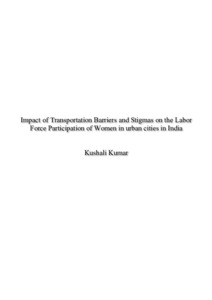| dc.rights.license | In Copyright | en_US |
| dc.creator | Kumar, Kushali | |
| dc.date.accessioned | 2022-04-21T13:01:36Z | |
| dc.date.available | 2022-04-21T13:01:36Z | |
| dc.date.created | 2022 | |
| dc.identifier | WLURG38_Kumar_POV_2022 | |
| dc.identifier.uri | http://hdl.handle.net/11021/35836 | |
| dc.description | Kushali Kumar is a member of the Class of 2022 of Washington and Lee University. | en_US |
| dc.description | Capstone; [FULL-TEXT RESTRICTED TO WASHINGTON AND LEE UNIVERSITY LOGIN] | en_US |
| dc.description.abstract | The three important aspects of an ethical framework that promoting human dignity are well-being, liberty, and equality (Pickett, 2022). All three of these are important for a person to live a life if dignity and happiness. In this paper, we are primarily focused on how during prioritizing the well-being of women, their liberty might be compromised. Placement of restrictions on women by their families to protect them takes away from them their authority to choose how they wish to live their lives. Similarly, not having authority and safety on the commute to and inside of the workplace also reduced the liberty of women as it restricts their choices. This puts them in an unequal standing as comparted to men who do not face the same restrictions and barriers. I use this framework along with Martha Nussbaum's capabilities approach to understand how these would impact the freedom of woman. . . . According to Nussbaum, the women in India would not have all their capabilities and would be considered not free. However, this might not be the case as to truly understand the dynamics of how the decision-making process of women and what restricts them requires a deeper understanding of the social structure and the power underneath the appearance of restriction. After the interviews I realized that most women, although were influenced by the opinions of family, valued their opinion by choice (as much as there exist self-perception of choice). Therefore, we need to be mindful before making generalization about the restrictions and abilities of an entire section of community and there need to be further research to understand the dynamics behind these decisions. [From Ethical Discussion section] | en_US |
| dc.format.extent | 25 pages | en_US |
| dc.language.iso | en_US | en_US |
| dc.rights | This material is made available for use in research, teaching, and private study, pursuant to U.S. Copyright law. The user assumes full responsibility for any use of the materials, including but not limited to, infringement of copyright and publication rights of reproduced materials. Any materials used should be fully credited with the source. | en_US |
| dc.rights.uri | http://rightsstatements.org/vocab/InC/1.0/ | en_US |
| dc.subject.other | Washington and Lee University, Shepherd Poverty Program | en_US |
| dc.title | Impact of Transportation Barriers and Stigmas on the Labor Force Participation of Women in Urban Cities in India | en_US |
| dc.type | Text | en_US |
| dcterms.isPartOf | RG38 - Student Papers | |
| dc.rights.holder | Kumar, Kushali | |
| dc.subject.fast | Women -- Employment -- India | en_US |
| dc.subject.fast | Liberty | en_US |
| dc.subject.fast | Equality | en_US |
| dc.subject.fast | Transportation | en_US |
| dc.subject.fast | Capabilities approach (Social sciences) | en_US |
| local.department | Shepherd Poverty Program | en_US |
| local.scholarshiptype | Capstone | en_US |
